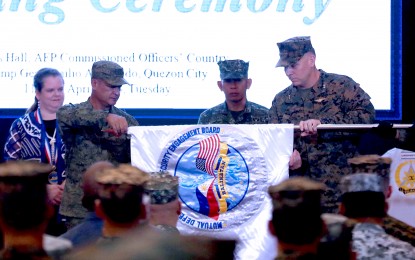
(PNA photo by Joey Razon)
MANILA – Filipino and American troops will hold amphibious assault operations, aerial gunnery exercises, and gas oil platform takedown (GOPLAT) in Palawan as part of this year's "Balikatan" exercises.
"One of the FTX (field training exercise) events will be conducted in the province of Palawan. The amphibious assault operations and aerial gunnery exercise will be held in Brooke’s Point, while the GOPLAT exercise will be at El Nido, Palawan," the Puerto Princesa City-based Western Command (Wescom) said in a Facebook post Tuesday night.
It added that Filipino and American participants in the GOPLAT exercise have arrived at the headquarters of Joint Task Force Malampaya in El Nido, Palawan shortly after the opening ceremony in Camp Aguinaldo, Quezon City.
"The 3rd Marine Brigade/Joint Task Force Peacock also joined the opening ceremony virtually at their headquarters in Barangay Tiniguiban, Puerto Princesa City. Marine forces will be the key players during the amphibious operations," Wescom added.
This year's "Balikatan," scheduled from April 11 to 28, is the 38th iteration of the annual military exercise between the Philippines and the United States.
"Wescom, along with the different joint task forces, welcomes all the participants of the 'Balikatan' 38-23. Wescom will continue to sharpen its sphere through the conduct of different exercises and strong partnership with joint forces and allies," it added.
With more than 17,500 combined troops from the Armed Forces of the Philippines (AFP) and the US military, the "Balikatan" will have four major events – the command post exercise, cyber defense exercise, FTX, and humanitarian civic assistance.
“For the AFP, in particular, this year’s 'Balikatan' Exercise is most timely, as we fast-track the enhancement of our capabilities for maritime security and domain awareness, as well as our employment concept of newly acquired equipment and weapon systems under our modernization program and application of newly developed doctrines – with the end-in-view of projecting a credible defense posture,” AFP chief Gen. Andres Centino said.
Participating forces will enhance their joint and combined capabilities in maritime security, amphibious operations, live-fire exercise, urban operations, aviation operations, counter-terrorism, and humanitarian assistance and disaster response.
The annual drills also signify a more robust security relationship between the long-time allies.
At the same time, partner nation Australia will participate in some events, and officials from Japan are expected to observe some.
Different assets and weapon systems will be used for various activities.
Centino noted that "Balikatan" remains one of the best training opportunities to improve both countries’ military arms, urging participants to embody professionalism, excellence, and the spirit of camaraderie.
“I am confident that both our Armed Forces shall reap invaluable benefits from this 'Balikatan' Exercise as we continue to pursue our shared goals of regional peace, security, and stability,” Centino said.
PH Army, US Marines train in CBRE
The Philippine Army (PA) on Wednesday announced that its troops trained with the US Marine Corps trained in chemical, biological, radiological and nuclear (CBRN) training program on Tuesday.
This took place at the 3rd Infantry Division (ID) headquarters in Camp General Macario Peralta Jr., Jamindan, Capiz, PA spokesperson Col. Xerxes Trinidad said.
He said the CBRNE is part of the ongoing "Balikatan" exercises.
"The CBRN Company of the Army Support Command and a platoon from 3ID and the US Marines Corps held discussions on mission-oriented protective posture (MOPP) and MOPP Gear Exchange. Moreover, they also held practical exercises applying what they learn in the discussion of the MOPP levels," Trinidad said.
He added that the CBRN training program is designed to enhance the capabilities of the Philippine military and its allied forces in responding to chemical, biological, radiological, and nuclear threats.
The training program will include classroom lectures, hands-on exercises, and simulations. (PNA)
